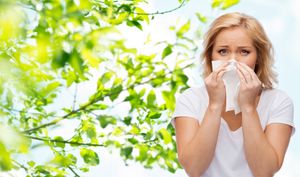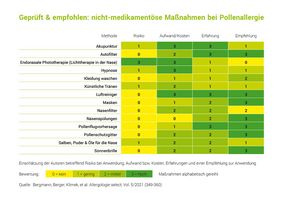Correct non-drug measures support therapy
The pollen season is currently particularly intense. Those affected therefore often look for ways to alleviate their symptoms. Many also resort to untested and/or pointless methods. An article written in collaboration with the medical director of the Austrian Pollen Information Service, Dr. Markus Berger, shows which measures have been proven in clinical studies and can therefore be helpful.
Experts agree that the basis must always be a medically supervised therapy.
The ragweed season is currently particularly strong in eastern Austria due to the prevailing weather conditions - but symptoms can also be triggered nationwide by long-distance transportation. To make matters worse, the reed blossom on Lake Neusiedl in mid-September can also affect grass allergy sufferers in Vienna if the wind conditions are right. Furthermore, the occurrence of Kamchatka mugwort, annual mugwort and wormwood mugwort can be expected to cause a peak in allergy symptoms in eastern Austria.
Allergy sufferers seek relief
It is therefore obvious that allergy sufferers will grasp at any straw to find relief. Even apart from conventional medicine. "But you have to be very cautious," emphasizes Dr. Markus Berger, medical director of the Austrian Pollen Information Service, assistant physician at the ENT department of Klinik Landstraße in Vienna and secondary physician at the Allergiezentrum Wien West.
Supporting measures tested & recommended
As additional measures, the authors recommend reducing contact with allergy triggers. This can be achieved primarily through allergen filters in the car, air purifiers, pollen screens on windows, face masks, the use of sunglasses, nasal rinsing and the use of pollen forecasts. Acupuncture can also alleviate the symptoms.
... Air purifiers, allergen filters in the car and on the windows
The filters installed in all cars today reliably keep out pollen and other particles. However, it is advisable to have them replaced every two years as the protection wears off. Indoor air filters are also interesting, and there have already been some studies on them. They could also be a previously underestimated way of preventing pollen allergies, although this still needs to be investigated more intensively. According to the authors of the study, pollen screens on windows are a good choice because they prevent pollen from entering the room. However, the extent to which this also reduces the clinical symptoms of the allergy is still unclear.
... Face masks not only protect against coronavirus
It has been repeatedly claimed that wearing a face mask or FFP2 mask not only protects against coronaviruses, but also against allergens. An assumption that experts have now confirmed: "We recommend wearing masks during the pollen season as an effective non-medicinal option for pollen allergy sufferers, especially on days when a high pollen load is predicted," emphasizes Berger.
... Nasal rinse & create a barrier
Another simple, inexpensive and painless way to reduce nasal problems is to rinse your nose regularly. "This can even reduce the amount of medication needed," emphasizes Markus Berger. The local application of ointments, powders or oils has also proven effective in studies. They are based on the idea of preventing pollen allergens from penetrating the nasal mucosa.
... Sunglasses & artificial tears
A simple way to relieve itchy and red eyes, as well as sneezing and a runny nose, is to wear sunglasses. This can significantly reduce discomfort. However, artificial tears (eye drops without active ingredients that moisten the eye) and cooling eye compresses are rarely used for allergic eye inflammation. However, artificial tears in particular can significantly reduce acute symptoms.
... Acupuncture, hypnosis & co
The benefits of acupuncture, which originates from Chinese medicine, are repeatedly discussed. For hay fever patients who do not respond adequately to standard drug therapy or have intolerable side effects, acupuncture could actually be useful, the experts state in their paper. Among other things, they cite a meta-analysis from 2020 in which 39 studies with over 3,400 participants were analyzed. The result: all acupuncture methods examined improved both nasal symptoms and quality of life in general. The effect presumably depends very much on the experience of the acupuncturist and the patient's willingness to engage with it. The situation is similar with (self-)hypnosis. So far, however, only minor effects have been demonstrated.
... Wash your clothes
Pollen allergy sufferers should remove any outer clothing worn outside before entering their home or work environment, the experts recommend. Most of the pollen can be removed simply by shaking or brushing it out, and all of it in the washing machine.
... Pollen count forecasts
Pollen forecasts can be a valuable tool for avoiding pollen or managing allergies. In times of high pollen count, they can help those affected to make important decisions about spending time outdoors, taking medication, etc. However, it is important to use reputable sources such as the Austrian Pollen Information Service. A micronutrient deficiency can also promote inflammation and make the immune system particularly sensitive to allergens. An iron deficiency in particular signals danger to the immune cells and leads to an increased, exaggerated immune response. A recent study by scientists from the Messerli Research Institute of MedUni Vienna, Vetmeduni Vienna and the University of Vienna shows that a targeted dietary measure can reduce the symptom burden of allergic reactions.
Physician consultation and drug therapy essential
Conclusion of the authors: Good medicine is subject to review according to generally accepted standards. In clinical studies, the effect, possible risks and side effects are examined using recognized scientific procedures and compared with placebos or other active substances or treatment methods. "It is important to pay attention to reputable sources, talk to the doctor treating you about it and stick to the treatment you have started," emphasizes Markus Berger. "Because none of the non-drug measures can replace standard drug therapy. However, they can certainly be valuable as a supplement."
References
1 Karl-Christian Bergmann, Markus Berger, Ludger Klimek, Oliver Pfaar, Barbora Werchan, Matthias Werchan, Torsten Zuberbier. Nonpharmacological measures to prevent allergic symptoms in pollen allergy: A critical review. Allergologie select, Vol. 5/2021 (349-360). e-pub: December 1, 2021. DOI 10.5414/ALX02294E
2 Bartosik T, Jensen SA, Afify SM, Bianchini R, Hufnagl K, Hofstetter G, Berger M, Bastl M, Berger U, Rivelles E, Schmetterer K, Eckl-Dorna J, Brkic FF, Vyskocil E, Guethoff S, Graessel A, Kramer MF, Jensen-Jarolim E, Roth-Walter F. Ameliorating Atopy by Compensating Micronutritional Deficiencies in Immune cells: a Double-Blind Placebo-Controlled Pilot Study. The Journal of Allergy and Clinical Immunology.JACI Volume 10, ISSUE 7, P1889-1902.e9, July 01, 2022. DOI:https://doi.org/10.1016/j.jaip.2022.02.028
Go to news overview



